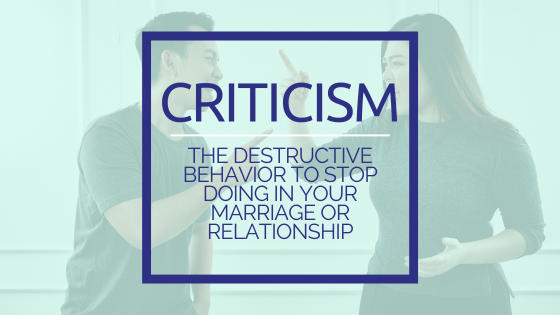Criticism
In the first post in this blog series on destructive communication patterns in your marriage, we defined The Four Horsemen of the Apocalypse, as described in the book The Seven Principles of Making Marriage Work, by Dr. Gottman and Nan Silver – criticism, contempt, defensiveness, and stonewalling. To understand more about each of these dysfunctional relational cycles, this second post will focus on criticism, a communication pattern that often presents itself during marriage counseling.
What is criticism?
Criticism represents a destructive communication style where one partner attacks the other's character or personality, rather than addressing a specific behavior or situation. Instead of addressing the specific behavior, one partner generalizes the other’s faults or blames the other partner.
Scenario showing criticism in a marriage
Susie and Bill were high school sweethearts and married after college. Given the length of their relationship, they have certainly had their fair share of arguments. However, lately, their disagreements have started to turn critical.
Recently, Susie expressed her frustration with Bill, after he’d forgotten their anniversary a few days earlier. When Bill walked into the kitchen to grab a snack, Susie said, “Bill, I can't believe you forgot our anniversary again. It's like you don't care about our relationship or the things that are important to me.” Hearing this, Bill immediately replied, “Oh, come on, Susie. It's just a date on the calendar. You're always making a big deal out of nothing. You're too sensitive, and you expect me to remember every little thing.”
In this short interaction, you can see clearly that Susie's part of the conversation turned critical when she accused Bill of not caring about their relationship. In doing this, she made a global statement about his character, implying he was neglecting their bond and being inconsiderate.
The Antidote to Criticism: How to stop criticism from destroying your marriage
Dr. Gottman suggests that couples combat criticism by practicing what he calls a "softened start-up." This technique involves approaching your partner by sharing your feelings and then relating these feelings to a specific concern in a gentle and non-accusatory way.
How could this interaction have gone differently?
Instead of making general statements about Bill's character, Susie could have said, "Bill, I really felt hurt and disappointed when you forgot our anniversary the other day. I always think about our anniversary as a day to celebrate us as a couple, and that day is important to me. It would mean a lot to me if you would remember that day as a special day for us." This approach focuses on Susie’s feelings and the specific behavior of Bill’s, rather than attacking him or globalizing his behavior.
Need a little help overcoming criticism in your relationship? Marriage counseling can help. Contact us for a free phone consultation and get your marriage back on track.
Article by Lindsay Poth, MA, LMFT Associate
Offering Austin Marriage Counseling, Individual Counseling for Women, & Individual Counseling for Men


































